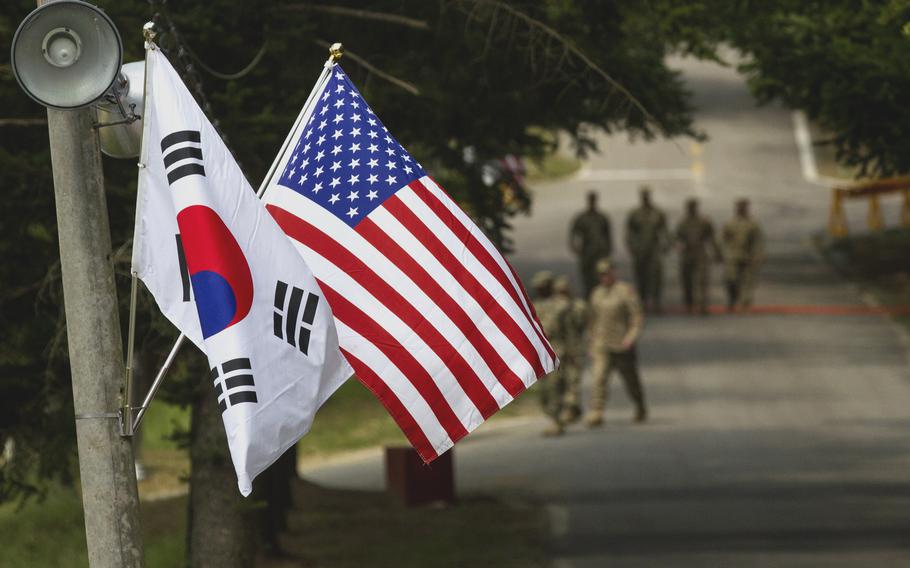
The South Korean and U.S. flags fly next to each other at Yongin, South Korea, Aug. 23, 2016. (Ken Scar/U.S. Army)
South Korea’s top diplomat on Wednesday said his country and the U.S. “effectively have agreed” on a draft declaration of a formal end to the Korean War.
The two allies have shared views on “the importance of the declaration,” and were now considering ways to make progress in consultations with North Korea, said Foreign Minister Chung Eui-yong at an end-of-year news conference.
“Our government views that an end-of-war declaration is a crucial step that we must go through in the process of achieving complete denuclearization and a lasting peace settlement on the Korean Peninsula,” Chung said. “Our government views that an end-of-war declaration provides a very useful opportunity to resume dialogue in a current deadlock in talks with North Korea.”
The 1950-53 Korean War ended with an armistice agreement between China, North Korea and the U.N. Command. The agreement was intended to end hostilities and to eventually bring about a “final peaceful settlement.”
Chung’s comments come weeks after South Korean President Moon Jae-in said the U.S., North Korea and China agreed “in principle” to declare a formal end to the Korean War. Moon’s presidency ends in May and his administration has sought to fulfill his campaign promise of bringing the war to a close.
Moon told reporters during a press conference Dec. 13 that a formal declaration was “not an ultimate goal” but a possible step to generate “significant dialogue momentum” with North Korea.
State Department spokesman Ned Price in a press briefing Tuesday reiterated that the U.S. harbors “no hostile intent” toward Pyongyang and is “prepared to meet without precondition.”
“We hope the DPRK will respond positively to our outreach,” Price said, referring to North Korea’s formal name, the Democratic People’s Republic of Korea.
Pyongyang has said little recently about a possible end-of-war declaration. Kim Yo Jong, the sister of North Korean leader Kim Jong Un and a senior official in the ruling party, described the possibility as “interesting” and a “good idea” in a September statement.
“We have discussed the end of war declaration at several opportunities in the past since we have appreciated of the necessity and meaning of the [declaration], which can be the beginning of the establishment of a system to ensure peace on the Korean Peninsula,” Kim said in a statement through the state-run Korean Central News Agency.
Critics of the declaration have voiced doubt about whether it would build relations with the communist regime.
Former Ambassador to South Korea Harry Harris, a retired admiral who once led U.S. Indo-Pacific Command and the Pacific Fleet, questioned how North Korea would change after a formal end to the Korean War.
“It’s not a peace treaty – the armistice will still be extant,” Harris told a discussion panel in November. “Our treaty obligations to defend South Korea will still be extant. And North Korea’s missile, nuclear and conventional capabilities will still be extant.”